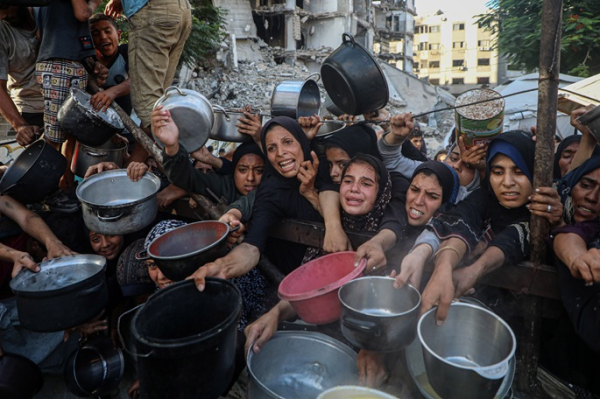
Amid continuing hostilities in Gaza, Palestinians continue to be killed or injured as they seek food from militarized aid hubs, UN humanitarians said on Wednesday, reported Xinhua.
The UN Office for the Coordination of Humanitarian Affairs (OCHA) said there were reports of dozens of people killed or injured Wednesday at one of those hubs.
"In the past week, severe injuries continued to be reported among people seeking aid," OCHA said. "The World Health Organization (WHO) reported one instance where a 21-year-old man was paralyzed for life after being shot while trying to collect a bag of flour from one of the militarized hubs."
The WHO was referring to the Gaza Humanitarian Foundation (GHF), founded by a private U.S. group and currently funded by the U.S. government. Contrary to established international humanitarian norms for distributing relief in local communities, the GHF set up four sites in the whole of Gaza in restricted Israeli military zones, where starving civilians enter through fenced lanes under the eyes of armed security contractors. Chaos results in gunfire.
OCHA said that months of escalating hostilities in Gaza have increased risks for the most vulnerable, including people with disabilities and older adults, who struggle to access what they need to survive.
The humanitarians said one of their partners found in a survey that more than 80 percent of people with disabilities in Gaza have lost wheelchairs, hearing aids, walkers and other assistive devices, having to endure many challenges, including the denial of access to humanitarian aid, discrimination, stigmatization and exposure to explosive ordnance.
The UN Population Fund (UNFPA) reported that domestic violence, sexual exploitation and abuse are on the rise in the Gaza Strip. Several safe spaces offering shelter, psychological support and coping mechanisms for women and girls have shut down or are functioning at reduced capacity.
UNFPA reported that the situation in Gaza is harrowing for women and girls. Pregnant women are delivering babies in the dark, with no electricity and no skilled care to treat potential complications. Thousands of mothers are starving.
OCHA said that in Al Mawasi and Gaza City, Doctors Without Borders reported treating more than 1,200 pregnant, breastfeeding women and children with severe and moderate malnutrition in their clinics. Between May and July, the number of people enrolled for treatment at its Gaza City clinic quadrupled, including hundreds of children under the age of 2, said the organization.
OCHA said that while small quantities of fuel entered Gaza again on Tuesday through the Kerem Shalom/Karem Abu Salem border crossing, severe supply shortages continue to threaten life-saving operations at hospitals, medical services and equipment, as well as telecommunications and water, sanitation and hygiene facilities.
"In northern Gaza, partners rehabilitated a well to try to address critical water shortages," OCHA said. "Although this will hopefully support patients and medical staff with hundreds of cubic meters every day, it is far from sufficient to meet people's needs."
UN agencies and their partners reiterated that hundreds of thousands of liters of fuel are critically needed every day to alleviate the crisis and address a dire situation.
OCHA said that after four months of sweeping Israeli restrictions on the entry of humanitarian assistance into Gaza, nearly all displacement sites reported people sleeping in the open, with no means of protection. No shelter supplies have entered during this period.
"This catastrophic situation must end. A ceasefire is long overdue," said the humanitarian office.
- Israeli
- Genocide
- Gaza
Source: www.dailyfinland.fi
